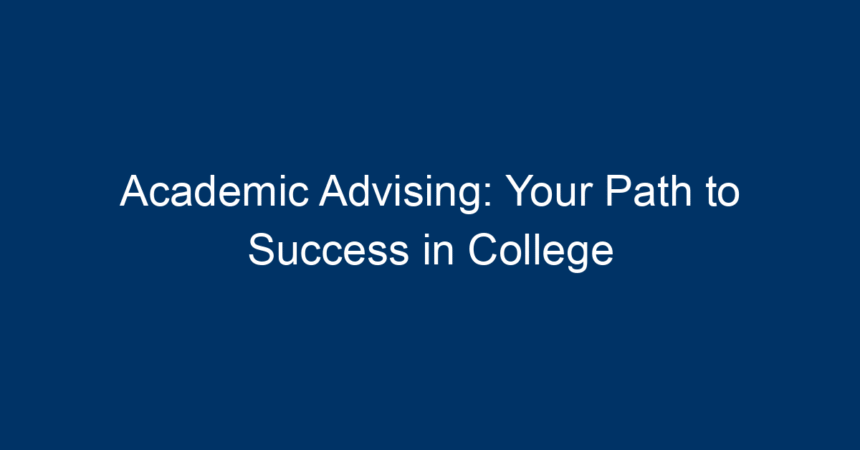As you embark on your college journey, the pathway to success may seem complex and daunting. With countless decisions to make—ranging from course selection to career planning—having the right guidance is essential. This is where academic advising comes into play. Academic advisors serve as invaluable resources, guiding you through the intricacies of academic life, helping you set and meet your goals, and ensuring you make the most of your educational experience.
In this article, we will explore the significance of academic advising, delve into its various aspects, and provide actionable insights to help you maximize your academic experience.
What is Academic Advising?
Academic advising is a collaborative process between students and advisors aimed at helping students make informed decisions about their academic journey. It encompasses a wide range of services, including course selection, degree planning, and strategies for academic success. Advisors provide resources to facilitate effective decision-making, ultimately leading to student empowerment and satisfaction.
The Role of Academic Advisors
Academic advisors wear many hats. They are mentors, guides, and advocates who play a crucial role in a student’s college experience. Here are some of the primary responsibilities of academic advisors:
-
Course Selection and Scheduling
- Advisors assist students in choosing courses that align with their academic and career goals. They help students navigate degree requirements and prerequisites, ensuring a smooth educational trajectory.
-
Degree Planning
- Advisors support students in developing a personalized academic plan that outlines the courses needed to achieve their degree. This plan often includes important milestones such as internships, study abroad opportunities, and extracurricular activities.
-
Skill Development
- Academic advising isn’t just about choosing classes; it also focuses on developing essential skills such as time management, study techniques, and critical thinking. Advisors frequently recommend workshops and resources to help students enhance their academic performance.
- Support Services
- Many advisors connect students with support services on campus, including tutoring, counseling, and career services. This holistic approach addresses various aspects of student life, contributing to overall well-being.
Why is Academic Advising Important?
Understanding the importance of academic advising can significantly impact your college experience. Here are several reasons why engaging with your academic advisor should be a priority:
-
Personalized Guidance
- Every student has unique aspirations and challenges. Academic advisors provide tailored advice that resonates with individual needs, helping to form a clear academic path.
-
Improved Academic Performance
- Studies show that students who regularly meet with academic advisors tend to have higher GPAs and are more likely to graduate on time. This trend underscores the value of proactive engagement with your advising team.
-
Career Preparation
- Advisors often possess insights into internships, job opportunities, and networking events. They can also assist with resume building and interview preparation, aligning academic efforts with career aspirations.
- Navigating Challenges
- College is filled with ups and downs. Whether you’re struggling academically, adjusting to college life, or facing personal challenges, academic advisors are equipped to help you navigate these hurdles and connect you with relevant resources.
Tips for Maximizing Your Academic Advising Experience
To harness the full potential of academic advising, consider these actionable tips:
1. Schedule Regular Meetings
Establish a habit of meeting with your academic advisor at least once a semester. Regular check-ins allow you to stay on track with your academic goals and to address any concerns early on.
2. Come Prepared
Before each meeting, prepare a list of questions, topics for discussion, and any challenges you may be facing. This preparation helps you maximize your time and gain the most value from each session.
3. Be Open to Feedback
Your advisor’s recommendations are based on their expertise and experience. Be open to their suggestions, and consider incorporating their advice into your academic plan.
4. Take Notes
During your meetings, take detailed notes regarding key points discussed. This will serve as a reference for the future, ensuring you remember important deadlines and decisions.
5. Utilize Campus Resources
Your academic advisor may recommend various campus resources. Make a conscious effort to explore these services, from tutoring centers to counseling offices, as they can further support your academic success.
The Impact of Technology on Academic Advising
In recent years, technology has revolutionized academic advising. Many colleges and universities now offer online advising platforms and tools to facilitate communication between students and advisors.
Virtual Advising
The advent of virtual advising enables students to connect with advisors from anywhere, promoting accessibility and convenience. Students can schedule virtual meetings, receive guidance through email, or engage in chat sessions that fit their busy schedules.
Online Resources
Many academic departments provide online resources, including degree audits and advising websites, where you can access vital information regarding your academic plan. Familiarize yourself with these tools to streamline your advising process.
Overcoming Common Hesitations About Academic Advising
Some students hesitate to engage with academic advising for various reasons. Here are some common misconceptions and the realities that debunk them:
"I Can Figure It Out on My Own"
While self-research is essential, academic advisors possess experience and knowledge that can save you time and effort. Their insights can help you avoid common pitfalls and streamline your academic journey.
"Advisors Only Care About My Grades"
While academic performance is essential, advisors also prioritize your overall well-being. They are available to discuss personal challenges, career aspirations, and life outside of academics, making them valuable allies in your college experience.
"I’m Not Sure I Need Advising"
Even if you feel confident, it’s still beneficial to connect with your advisor. They can help you explore new opportunities, evaluate your academic interests, and introduce you to experiences that may enhance your college life.
Conclusion: Empower Your College Experience Through Academic Advising
Academic advising is more than a support system; it is a pathway to achieving your educational and career aspirations. By actively engaging with your academic advisor, you can turn potential challenges into opportunities for growth and success.
Chart your course to academic excellence by leveraging the guidance available to you. Take the time to schedule an appointment, prepare for your meetings, and immerse yourself in the wealth of resources your institution has to offer. By doing so, you’ll not only enhance your college experience but also lay a strong foundation for your future endeavors.
So, don’t hesitate—reach out to your academic advisor today and take that pivotal step towards a successful and fulfilling college journey!




